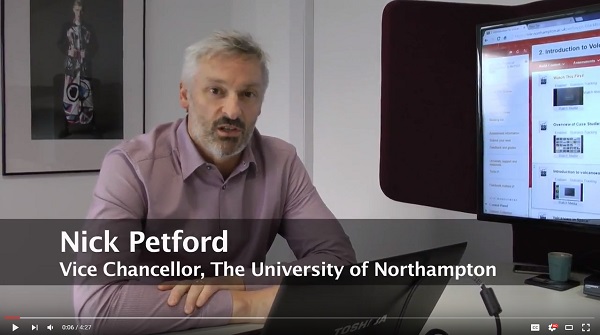Blended Learning and Physical Volcanology with Professor Nick Petford
Most university lecturers will have their favourite anti-lecturing quote. Mine has always been Camus’ oft-quoted “Some people talk in their sleep. Lecturers talk while other people sleep”. Another favourite is the variously attributed definition “Lecture: a process by which the notes of the professor become the notes of the student, without passing through the minds of either.”
In fairness to university lecturers, none of the lecturers I know deliver these kind of dreary monologues. Also, if a lecturer is timetabled into a room with a lectern, projector and screen, and tiered seating containing 250 students then surely we cannot chastise them for using that room for the purpose it was designed and intended for. Obviously such space can be subverted and used differently (as professors such as Eric Mazur and Simon Lancaster have done), but surely the best solution is simply not to build these kinds of spaces in the first place. If active, participatory learning in small groups is what is best (and the evidence suggests that it is) then why not build spaces that accommodate this kind of learning and teaching.
At the University of Northampton that’s exactly what is happening. As was recently reported in the Sunday Times, the University of Northampton’s Waterside campus “is to be built with no traditional lecture theatres, providing further evidence that the days of professors imparting knowledge to hundreds of students at once may be numbered.” The new campus “is the first in the UK to be designed without large auditoriums.”
While it is true that the majority of teaching that takes place at the Waterside campus is planned to be active, interactive and participatory, and to take place in small classes, there will obviously need to be some element of professors imparting knowledge to their students. This is, after all, for most people a key part of the process of teaching and learning. However, the plan for Waterside is for such ‘professorial knowledge imparting’ to take place online, prior to attending class; a process often known as flipped or blended learning. This means that time is not taken up in the small class sessions with getting knowledge across to the students, or with ‘covering content’, but on helping students to understand, assimilate and make sense of the knowledge they have grappled with prior to attending class.
Professor Nick Petford, Vice Chancellor of the University of Northampton, is not only building a campus in which active, participatory, small class teaching will be the norm, but as a member of the teaching staff he is already teaching in this way himself. Professor Petford adopted this blended learning approach in his physical volcanology classes during the 2015/16 academic year, and you can see him talking about how it went in this video.
Recent Posts
- H5P (HTML5 package) content types meets the needs of Jim Atkinson, Staff Development Trainer
- Blackboard Upgrade – July 2025
- StudySmart 2 – Student Posters
- NILE Ultra Course Award Winners 2025
- Blackboard Upgrade – June 2025
- Learning Technology / NILE Community Group
- Blackboard Upgrade – May 2025
- Blackboard Upgrade – April 2025
- NILE Ultra Course Awards 2025 – Nominations are open!
- Blackboard Upgrade – March 2025
Tags
ABL Practitioner Stories Academic Skills Accessibility Active Blended Learning (ABL) ADE AI Artificial Intelligence Assessment Design Assessment Tools Blackboard Blackboard Learn Blackboard Upgrade Blended Learning Blogs CAIeRO Collaborate Collaboration Distance Learning Feedback FHES Flipped Learning iNorthampton iPad Kaltura Learner Experience MALT Mobile Newsletter NILE NILE Ultra Outside the box Panopto Presentations Quality Reflection SHED Submitting and Grading Electronically (SaGE) Turnitin Ultra Ultra Upgrade Update Updates Video Waterside XerteArchives
Site Admin


